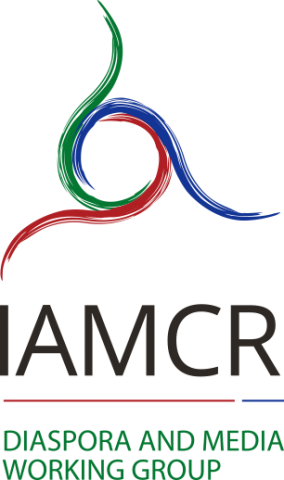
The Diaspora and Media Working Group of the International Association for Media and Communication Research (IAMCR) invites the submission of proposals for papers and panels for IAMCR 2022, which will be held online from 11 to 15 July 2022. The conference will also have a national hub at Tsinghua University in Beijing. The deadline for submission is 9 February 2022, at 23.59 UTC.
See the CfPs of all sections and working groups >
Conference Themes
IAMCR conferences have a main conference theme (with several sub-themes) that is explored from multiple perspectives throughout the conference in plenaries, in the programmes of our sections and working groups, and in the Flow34 virtual cinema and podcasts stream. They also have many themes defined by our 33 thematic sections and working groups. Proposals submitted to sections and working groups may be centered on an aspect of the main conference theme as it relates to the central concerns of the section or working group, or they may address the additional themes identified by the section or working group in their individual calls for proposals.
The main theme for IAMCR 2022, “Communication Research in the Era of Neo-Globalisation: Reorientations, Challenges and Changing Contexts,” is concerned with possibilities for rethinking communication research agendas in the post-pandemic world, which has seen dramatic shifts in the way we interact and understand our physical, social, cultural, political and material environments.
Eight sub-themes of this central theme have been identified: Reorienting Media and Communication Research in the Era of Neo-Globalisation; Artificial Intelligence in Global Communication Contexts; Cultural Identities and Dis-Identities in the Era of Neo-Globalisation; Communication for Sustainability: Climate Change, Environment, and Health; Media Ethics and Principles in the Digital Age; Media, Communication, and the Construction of Global Public Health; Data/Digital Science and Intercultural Communication; Digital Platforms and Public Service: Science, Technology and Sustainability. See the complete theme description and rationale here.
The Diaspora and Media (DIM) Working Group welcomes proposals that address the working group’s interest in diaspora and media. We are particularly interested in contributions that address key topics from interdisciplinary and transdisciplinary perspectives. Now more than ever, academic work must address, from a critical perspective the need to rethink borders and boundaries, physical and imaginary. We seek research that addresses theory and practice, examine theoretical frameworks and methodological approaches, as well as analyze findings in lieu of their contribution to the field.
The DIM Working Group aims to provide fertile terrain for academic exchange, discussions, and collaboration among the contributors. We encourage submissions that address diasporic transnationalism and media representation, (miss)representation, and auto-representation of migrants in the public sphere. We are also looking for research on new narratives in trans-local contexts and the connective role of media spaces within diasporic groups.
We also welcome contributions that explore any of the five sub-themes that have been identified in the general CFP: "Communication Research in the Era of Neo-Globalisation: Reorientations, Challenges and Changing Contexts".
Contributions could be built on, but not limited to, the following key topics:
- Studies on digital diasporas that are contributing to the discussion on new approaches when studying migration, mobility, diaspora and transnational scenarios
- Theoretical studies on new trends in the era of neo-globalization and the consequences to migration studies
- Discussions on new methodological approaches to the study of diaspora and media in a post-digital era
- Studies on the relationship between borders, securitization, and the relationship with the Covid-19 pandemic
- Precarization, labor, and labor migration between the Global North and South
- Rights, access to services for migrant populations during and to the post-pandemic
Guidelines for abstracts
Abstracts are requested for the Online Conference Papers component. Abstracts submitted to the Diaspora and Media Working Group should have between 300 and 500 words and must be submitted online at https://iamcr2022.exordo.com. Abstracts submitted by email will not be accepted.
The deadline to submit abstracts is 9 February 2022 at 23h59 UTC.
See important dates and deadlines to keep in mind
It is expected that authors will submit only one (1) abstract. However, under no circumstances should there be more than two (2) abstracts bearing the name of the same author, either individually or as first author. No more than one 1 abstract can be submitted by an author to the Diaspora and Media Working Group. Please note also that the same abstract or another version with minor variations in title or content must not be submitted to more than one section or working group. Any such submissions will be deemed to be in breach of the conference guidelines and will be rejected.
Proposals are accepted for both single Papers and for Panels with several papers (in which you propose multiple papers that address a single theme). Please note that there are special procedures for submitting panel proposals. You can find the detailed procedures when submitting your abstract online in the abstract submission system.
If your abstract is accepted, you will need to submit your full conference paper (1,000 to 4,000 words) by 7 June 2022, in order to be included in the programme.
Languages
The Diaspora and Media Working Group accepts abstracts in English, Portuguese, and Spanish. However, English is preferred because we have a limited number of reviewers who can evaluate abstracts in other languages. We do ask that members correspond with the chairs in English, where possible.
For further information about the conference contact beijing2022@iamcr.org
For further information about the Diaspora and Media Working Group, its themes, submissions, and panels please contact:
Jessica Retis
jessica.retis@gmail.com
and/or
Sofia Zanforlin
szanforlin@gmail.com
Join the DIM working group in social media: https://www.facebook.com/groups/499328720140317